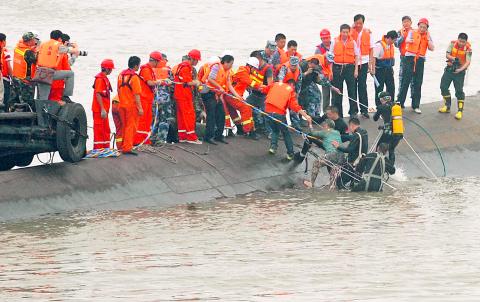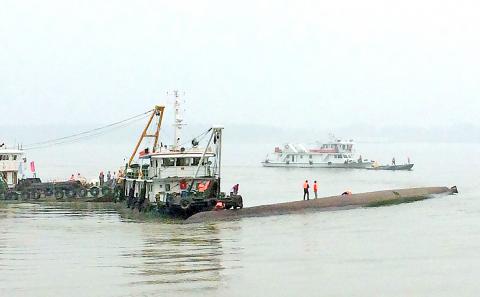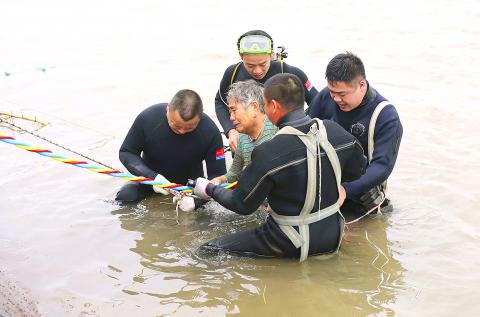Rescuers yesterday fought stormy weather as they searched for more than 400 people, many of them elderly tourists, missing after a cruise ship capsized on China’s Yangtze River.
The accident on Monday night is likely to end up as China’s worst shipping disaster in almost 70 years.
Divers and other rescue workers rescued 15 people they found trapped in the upturned hull of the four-deck Eastern Star, a fraction of the 458 people that state media said were on board when the ship capsized in what officials called a tornado.

Photo: AFP
Distraught relatives of passengers scuffled with officials in Shanghai, where many of those on board booked their trips, angry about what they said was a lack of information.
Dozens of rescue boats battled wind and rain to reach the ship, upturned in water about 15m deep.
Xinhua news agency said rescuers could hear people calling for help from inside the hull, while TV news showed rescuers cutting through it with an angle grinder.

Photo: AFP
One of the people pulled from the capsized boat was a 65-year-old woman. Divers used breathing gear to bring her to the surface.
About another dozen had been rescued and six bodies recovered, media reported, leaving more than 430 people unaccounted for.
China’s weather bureau said a tornado hit the area where the boat was, rare in a nation where are not common.

Photo: AFP
The People’s Daily, which published a passenger manifest on its microblog, said those on board the Eastern Star ranged in age from three to more than 80.
Tour guide Zhang Hui, 43, told Xinhua the boat sank very fast and he scrambled out a window in torrential rain, clutching a life vest as he could not swim.
“Wave after wave crashed over me; I swallowed a lot of water,” Zhang said, adding that he was unable to flag down passing boats and finally struggled ashore holding onto a branch as dawn broke.
Chinese President Xi Jinping (習近平) ordered that no efforts be spared in the rescue and Chinese Premier Li Keqiang (李克強) went to the scene of the accident in Hubei Province, Xinhua said.
About 60 family members gathered outside a travel agency in Shanghai and demanded information.
“I found out about this only on the television news while I was at work and I came here,” 35-year-old Wang Sheng said, adding that his parents were on board. “I cried all the way here and here I cannot find anyone, the door is locked.”
The ship’s captain and chief engineer, who were among the few to be rescued, were detained by police for questioning, Xinhua said.
According to the Yangtze River Administration of Navigational Affairs, the captain and crew said the ship sank quickly after it was caught in the tornado.
Xinhua said that initial investigations had found the ship was not overloaded and had enough life vests for its passengers. Those rescued were wearing life vests, Xinhua said.
Among those on board were 406 tourists, many elderly, along with 47 crew members and five tour guides, the People’s Daily said.
The Eastern Star, which has the capacity to carry more than 500 people, was heading to Chongqing from Nanjing, the capital of Jiangsu Province. It sank at about 9:28pm in the Jianli section of the Yangtze.
The Eastern Star is owned by Chongqing Eastern Shipping Corp.

The US government has signed defense cooperation agreements with Japan and the Philippines to boost the deterrence capabilities of countries in the first island chain, a report by the National Security Bureau (NSB) showed. The main countries on the first island chain include the two nations and Taiwan. The bureau is to present the report at a meeting of the legislature’s Foreign Affairs and National Defense Committee tomorrow. The US military has deployed Typhon missile systems to Japan’s Yamaguchi Prefecture and Zambales province in the Philippines during their joint military exercises. It has also installed NMESIS anti-ship systems in Japan’s Okinawa

TRAGEDY STRIKES TAIPEI: The suspect died after falling off a building after he threw smoke grenades into Taipei Main Station and went on a killing spree in Zhongshan A 27-year-old suspect allegedly threw smoke grenades in Taipei Main Station and then proceeded to Zhongshan MRT Station in a random killing spree that resulted in the death of the suspect and two other civilians, and seven injured, including one in critical condition, as of press time last night. The suspect, identified as a man surnamed Chang Wen (張文), allegedly began the attack at Taipei Main Station, the Taipei Fire Department said, adding that it received a report at 5:24pm that smoke grenades had been thrown in the station. One man in his 50s was rushed to hospital after a cardiac arrest

ON ALERT: Taiwan’s partners would issue warnings if China attempted to use Interpol to target Taiwanese, and the global body has mechanisms to prevent it, an official said China has stationed two to four people specializing in Taiwan affairs at its embassies in several democratic countries to monitor and harass Taiwanese, actions that the host nations would not tolerate, National Security Bureau (NSB) Director-General Tsai Ming-yen (蔡明彥) said yesterday. Tsai made the comments at a meeting of the legislature’s Foreign Affairs and National Defense Committee, which asked him and Minister of National Defense Wellington Koo (顧立雄) to report on potential conflicts in the Taiwan Strait and military preparedness. Democratic Progressive Party (DPP) Legislator Michelle Lin (林楚茵) expressed concern that Beijing has posted personnel from China’s Taiwan Affairs Office to its

PUBLIC SAFETY: The premier said that security would be tightened in transport hubs, while President Lai commended the public for their bravery The government is to deploy more police, including rapid response units, in crowded public areas to ensure a swift response to any threats, President William Lai (賴清德) said yesterday after a knife attack killed three people and injured 11 in Taipei the previous day. Lai made the remarks following a briefing by the National Police Agency on the progress of the investigation, saying that the attack underscored the importance of cooperation in public security between the central and local governments. The attack unfolded in the early evening on Friday around Taipei Main Station’s M7 exit and later near the Taipei MRT’s Zhongshan